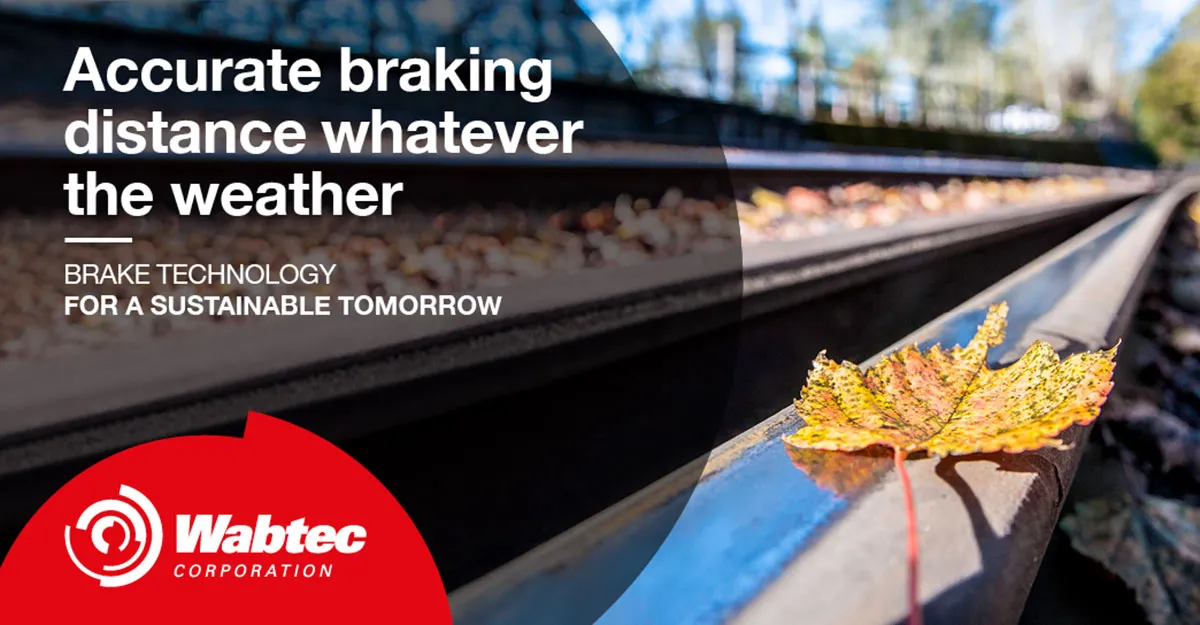We don’t just make braking distance reproducible, but we also improve it in impressive proportions!
As the greenest form of passenger transport, rail travel is at the heart of the matter when it comes to lowering emissions of greenhouse gases (GHG). It is therefore essential to find ways to accommodate more people on the network while providing a comfortable passenger experience. Due to urban concentration and a lack of funding, it is unlikely that existing infrastructure will be expanded, so the only option to achieve greater passenger numbers is to run more trains per hour on existing tracks. For this to be a safe and viable option, rail operators need to overcome the challenge of braking performance limitations due to adhesion between wheels and rails.
What’s at stake?
In normal situations, braking performance is limited by the adhesion between the rail and the wheel. Adverse weather conditions and pollution can diminish wheel-rail adhesion, extending train braking distances.
In addition to lowering performance, alterations in adhesion can cause both rolling stock and infrastructure to deteriorate. Ultimately, this can reduce train availability and shorten wheel lifetime, generating additional maintenance costs. If adhesion is degraded even further, restrictive operational rules have to be considered, such as reducing permitted speeds or managing rail cleaning.
To limit this, operators require the brake system of their trains giving them much more confidence on the achieved stopping distances whatever are the conditions. In order to provide them with a much more efficient system, Wabtec has developed its innovative DistanceMaster concept. This concept is supported by the 3 following pillars: The Wabtec adaptive WSP, the Wabtec Deceleration Compensation, and the Wabtec Smart Sanding.
How Wabtec’s DistanceMaster solution deals with the bottleneck
Wabtec has developed its Adaptive WSP solution that include innovative algorithms improving the WSP performance even in the worst extremely low adhesion conditions. It offers significant advantages in terms of safety, efficiency, maintenance costs, and commissioning time.
When used in conjunction with our deceleration compensation solution, it reduces the elongation of braking distances by 50% (20 m at 90 km/h in standard degraded adhesion conditions). Regardless of the train spacing system in place, ensuring a reduction in the emergency braking distance in degraded condition is a key contribution for increasing the safety for expected brake performances. It offers the driver greater confidence and could avoid (or limit) the need for operational restrictions. The combination of these solutions also improves guaranteed emergency brake rate and in the frame of advanced signaling systems can offer higher train flows.
The Wabtec Smart sanding system that have the capacity of fine adjusting over the train the sand laying by taking into consideration the individual sliding level of the axles, the train speed (while respecting the TSI requirements) is contributing further to the improvement of the brake performances: Used jointly the adaptive WSP and the deceleration compensation, it has been demonstrated in field tests the elongation of the braking distance can be reduced by 95% vs. what is achieved with the previous generation of WSP.
The benefits are better line efficiency, which has a direct impact on operator’s revenue, improved resilience to extreme weather conditions, and greater train punctuality. Preliminary tests have shown that trains using WSP and deceleration compensation experience around 50% fewer flats in very low adhesion conditions; this is significant as flats reduce wheel lifespan and train availability and, in extreme cases, can cause safety issues. Lastly, Adaptive WSP requires no initial setting, which can save up to three weeks of commissioning time compared to conventional WSP.
Getting passengers moving
Wabtec’s Adaptive WSP unit has been tested in service for one year by Amtrak on the North American market with excellent results, and is currently undergoing EN certifications. Adaptive WSP and deceleration compensation are set to equip full trains for four-season tests for networks in New York and Bilbao in Q4 2021 and Q1 2022 respectively. Implementation of the complete DistanceMaster on a train for service is also planned in Q1 2022 in Bilbao.
With more and more operators making the switch to these cutting-edge solutions, the future of rail transport looks bright. Wabtec is committed to supporting operators in optimizing the functioning of their networks to accommodate more passengers on more trains safely and quickly, reducing GHG emissions along the way.
